The Campaign
Democratic nominee
George Mitchell was an early front runner for The Blaine House in 1974. He had bested Joseph Brennan in the Democratic primary, and had the backing of popular former Governor, and then Maine Senator Edmund Muskie. Many Maine political observers believed he would be able to easily beat back the challenge from James Erwin and become Maine's next Governor. [1]

The Blaine House, also known as James G. Blaine House, is the official residence of the Governor of Maine and his or her family. The Executive Mansion was officially declared the residence of the Governor in 1919 with the name "Blaine House". It is located at Capitol and State streets in Augusta, across the street from the Maine State House.
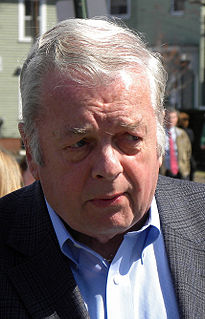
Joseph Edward Brennan is an American Democratic Party lawyer and politician from Maine. He served as the 70th Governor of Maine from 1979 to 1987. He is a former commissioner on the Federal Maritime Commission.

Edmund Sixtus Muskie was an American politician who served as the 58th United States Secretary of State under President Jimmy Carter, a United States Senator from Maine from 1959 to 1980, the 64th Governor of Maine from 1955 to 1959, a member of the Maine House of Representatives from 1946 to 1951, and the Democratic Party's candidate for Vice President of the United States in the 1968 election.
Mitchell ran on the campaign theme "There are two Maines. There should only be one.". He argued that Maine was a gorgeous state with rich natural resources and was a thriving tourist destination, but at the same time it had high unemployment and a large number of Maine families lived below the poverty line. His campaign focuses on ways to bring together the two Maines – a place with a protected environment and a strong economy. [1]
Republican nominee
James Erwin of York, another early front runner in the race, [2] had served in the Maine House and Senate before winning his first of three terms as attorney general in 1967. In 1970, he had lost his first run for governor by 890 votes to the Democratic incumbent Curtis, and his campaign theme was "Erwin This Time." [3] He defeated Harrison Richardson, also a state legislator, for the nomination.
Harrison L. Richardson was an American lawyer and politician from Maine. A Republican, Richardson served three terms in the Maine House of Representatives (1965-1971) and one term in the Maine Senate (1973–75). He represented Cumberland in the Legislature.
According to his 2005 obituary, Erwin was "born in New York City and grew up in Englewood, N.J. He spent his summers on his mother's family's farm in South Berwick, which is now the site of Berwick Academy. He graduated from Dartmouth College and served in the Army during World War II." [3]
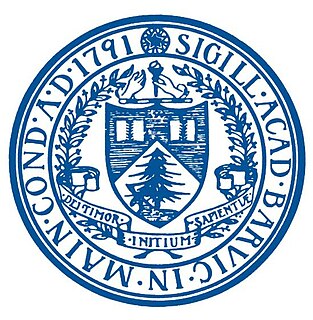
Berwick Academy is a college preparatory school located in South Berwick, Maine. Founded in 1791, it is the oldest educational institution in Maine and one of the oldest private schools in North America. The school sits on an 80-acre, 11-building campus on a hill overlooking the Salmon Falls River, near the border between Maine and New Hampshire. Approximately 565 students in grades Pre-K through 12 attend this coeducational day and boarding school. The majority of students commute to Berwick from approximately 60 communities in the surrounding regions of southern Maine, southeastern New Hampshire and northeastern Massachusetts. There are also some residential students who come from across the world.
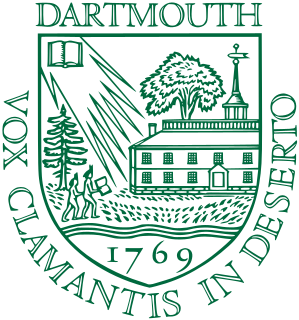
Dartmouth College is a private Ivy League research university in Hanover, New Hampshire, United States. Established in 1769 by Eleazar Wheelock, it is the ninth-oldest institution of higher education in the United States and one of the nine colonial colleges chartered before the American Revolution. Although founded as a school to educate Native Americans in Christian theology and the English way of life, Dartmouth primarily trained Congregationalist ministers throughout its early history. The university gradually secularized, and by the turn of the 20th century it had risen from relative obscurity into national prominence as one of the top centers of higher education.
Independent candidate
James B. Longley was the owner of a successful insurance agency in Lewiston, who got his first opportunity in statewide politics when then-Governor Curtis asked him to lead a state government commission called The Maine Management and Cost Survey Commission, which was intended to make government more efficient, and cut costs. After some initial reluctance, Longley accepted the position and pursued the job with vigor. [4]

James Bernard Longley Sr. was an American politician. He served as the 69th Governor of Maine from 1975 to 1979, and was the first Independent to hold the office. In 1949, he married the former Helen Angela Walsh, who died on September 13, 2005. They had five children, including former Republican U.S. Representative James B. Longley Jr.. Longley Sr., a graduate of Bowdoin College in Brunswick, Maine, resided in Lewiston and Auburn, Maine.

Lewiston is the second largest city in Maine and the most central city in Androscoggin County. The city borders the coastal sideways of the Gulf of Maine and is south of Augusta, the state's capital, and north of Portland, the cultural hub of Maine. It is one-half of the Lewiston-Auburn Metropolitan Statistical Area, commonly referred to as "L.A." or "L-A." Lewiston exerts a significant impact upon the diversity, religious variety, commerce, education, and economic power of Maine. It is known for a relatively low cost of living, substantial access to medical care, and an extremely low violent-crime rate. While the dominant language spoken in the city is English, it is home to the largest French-speaking population in the United States while it is second to St. Martin Parish, Louisiana, in percentage of speakers.
Longley made several recommendations that were projected to save the state in excess of $24 million. One of his major proposals included restructuring the Maine university system, which he felt was grossly inefficient. [4] His work at the commission gave him a prominent statewide profile, something he decided to try to turn into an electoral mandate when Governor Curtis retired in 1974.
Longley had been a lifelong Democrat, but due to earning a maverick reputation acting in a non-partisan role on the cost-cutting commission and because he inadvertently missed the filing deadline for party candidates, he ran as an independent. [4] Some Maine observers believed he knew he would be unable to beat both former Muskie adviser George Mitchell and state Senator Joseph Brennan in a Democratic primary, causing him to not file with the party. He ran on the slogan "Think About It", a phrase he often used with insurance customers to get them to consider his products. [4]
The issues
In 1974, the economy was volatile and inflation was high. Maine's economy was in a weak position with high unemployment and low wages, and all three candidates focused on this economic uncertainty in their respective campaigns. Issues such as oil prices, health care, the environment and care for the elderly were also major themes that dominated the debate by the candidates. [1]
Longley campaigned on a platform of cutting government and making it more efficient, hoping to capitalize on the reputation he had earned with the commission. However, he struggled to get attention in the race, as most media outlets focused on Mitchell and James Erwin (who had run for Governor the previous cycle as well). Toward the tail end of the campaign, however, increased attention was focused on Longley, with newspapers profiling his candidacy and speculating that he was on par with the other two candidates. When the Bangor Daily News issued an endorsement of Longley, many observers believe it gave Longley instant legitimacy. [4]
The election
An Associated Press poll three days before the election showed Mitchell and Erwin running neck and neck, with Longley trailing by double digits. However, that same poll noted that 37 percent of the electorate was still undecided, leaving open the possibility that they could swing any direction at the last minute. [4]
On Election Day, Longley won with 39 percent of the vote, followed by Mitchell at 36 percent, and Erwin with 23 percent.
Mitchell attributed his loss to "distrust and cynicism about politics and politicians", "widespread concern over the economy", and "the fact that James Longley had conducted a very excellent campaign." [1]

The 1972 United States presidential election was the 47th quadrennial presidential election. It was held on Tuesday, November 7, 1972. Incumbent Republican President Richard Nixon defeated Democratic Senator George McGovern of South Dakota.
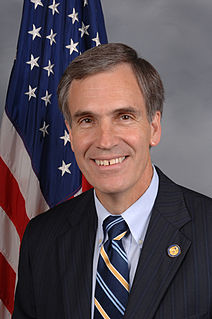
Thomas Hodge Allen is a former member of the United States House of Representatives representing Maine's 1st congressional district, and the Democratic nominee for the U.S. Senate in 2008 against Republican incumbent senator Susan Collins. Allen lost to Collins.

John Elias Baldacci is an American politician who served as the 73rd Governor of Maine from 2003 to 2011. A Democrat, he also served as a member of the United States House of Representatives from 1995 to 2003.

The 1978 United States Senate elections in the middle of Democratic President Jimmy Carter's term. Thirteen seats changed hands between parties. The Democrats at first lost a net of two seats to the Republicans, and then one more in a special election. Democrats nevertheless retained a 58-41 majority.

James B. "Jim" Longley Jr. is a former member of the U.S. House of Representatives. He is a Republican politician from Maine.

Charles E. Summers Jr. is an American politician, businessman, Iraq War veteran and member of the Republican Party from the state of Maine. He currently serves as Acting Assistant to the Secretary of Defense for Public Affairs in the Trump Administration.

United States gubernatorial elections were held on November 2, 2010 in 37 states and two territories. As in most midterm elections, the party controlling the White House lost ground. Democrats did take five governorships from the Republicans, and Republicans took 11 governorships from the Democrats. An independent won one governorship previously held by a Republican. A Republican won one governorship previously held by an independent. Republicans held a majority of governorships for the first time since before the 2006 elections. One state, Louisiana, had no election for governor, but did feature a special election for lieutenant governor.

The 2010 Maine gubernatorial election took place on November 2, 2010. Incumbent Democratic Governor John Baldacci was term-limited and unable to seek re-election. Primary elections took place on June 8, 2010. The candidates who appeared on the November ballot were : Eliot Cutler (Independent), Paul LePage (Republican), Libby Mitchell (Democrat), Shawn Moody (Independent), and Kevin Scott (Independent).

Janet Trafton Mills is an American lawyer and politician serving as the 75th Governor of Maine, since January 2019. She previously served as the Attorney General of Maine on two separate occasions.
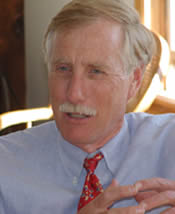
The 1998 Maine gubernatorial election took place on November 3, 1998. Independent Governor Angus King sought a second and final term as governor. King faced off against former United States Congressman James B. Longley, Jr., the Republican nominee; attorney Thomas J. Connolly, the Democratic nominee; and several other independent candidates, including Green candidate Pat LaMarche, who would later serve as the Green Party's Vice Presidential nominee in the 2004 presidential election.

The 1978 Maine gubernatorial election took place on November 7, 1978. Incumbent Independent Governor James B. Longley had promised to not seek a second term when he was elected in 1974, and held true to his pledge. Former State Senator Joseph Brennan of the Democratic Party defeated both challenger Republican Linwood E. Palmer, Jr. and Independent candidate Herman Frankland.

The 1970 Maine gubernatorial election took place on November 3, 1970. Incumbent Democratic Governor of Maine Kenneth M. Curtis chose to seek re-election. Curtis won a landslide victory in the Democratic primary. His general election opponent was Maine Attorney General James Erwin, the Republican nominee. Erwin had also easily won his respective party primary and received the Republican nomination for governor. Curtis narrowly defeated challenger in one of the tightest elections in Maine history – the final margin of victory was a mere 890 votes. Curtis received 163,138 votes (50.14%), while Erwin had 162,248 votes (49.86%).
John Jenkins is an American community organizer and politician who served as the first African American Mayor of Lewiston, Maine from 1994 to 1998, a Member of the Maine Senate from 1996 to 1998 and the Mayor of Auburn, Maine from 2007 to 2009.

The 2014 Maine gubernatorial election took place on November 4, 2014, to elect the governor of Maine. Incumbent Republican governor Paul LePage ran for re-election to a second term in office, against sitting congressman from the second district, Mike Michaud, and second-place finisher from the 2010 gubernatorial election, attorney Eliot Cutler. The primary elections were held on June 10, 2014.

The 2018 Maine gubernatorial election took place on November 6, 2018, to elect the next Governor of Maine. It occurred along with elections for the U.S. Senate, U.S. House, and other state and local elections. Incumbent Republican Governor Paul LePage was term limited and could not seek reelection to a third consecutive term in office.

The 2018 United States Senate election in Maine was held on November 6, 2018, alongside a gubernatorial election, U.S. House elections, and other state and local elections. Incumbent Independent Senator Angus King won reelection to a second term.

The 1968 United States presidential election in Connecticut took place on November 5, 1968, as part of the 1968 United States presidential election, which was held throughout all 50 states and D.C. Voters chose eight representatives, or electors to the Electoral College, who voted for president and vice president.
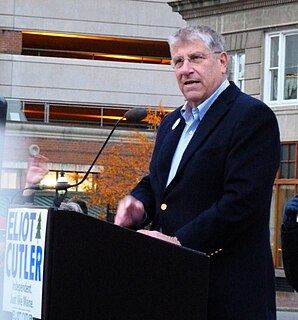
Eliot Cutler is an American lawyer who was an Independent candidate in Maine's 2010 and 2014 gubernatorial races. In 2010, he placed second in a multi-way race, receiving 208,270 votes, equaling 35.9%, narrowly losing to Republican Paul LePage. In 2014 he garnered only 8.4%, placing third behind both the Democratic candidate as well as LePage, who was re-elected with 48.2% of the vote. Both times, he was claimed to be a spoiler for the Democratic candidate. He has served in the Carter Administration as part of the U.S. Office of Management and Budget.



























